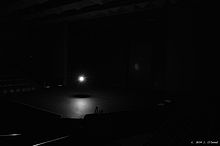There’s this huge tradition in theatre… our high school theatre… uh, department… where after we close a show, everyone in the cast and crew, like, steals one of their props or, like, a piece of the set or something. And we’re not technically supposed to do that, like, all the props and sets are supposed to, like, be deconstructed and put back in the vault, but, like, nobody actually cares. But um… yeah, my first show at the high school, I didn’t know this was a thing, so I didn’t take anything, which… I cry (laughs). But then for the spring show my freshman year, I… we did Pippin and I was one of the, like, farmer guys in Act Two, which, like… wooo, big role, I know, but, um… during strike, I almost forgot about that, but, uh… fortunately, I was just walking around backstage after school one day, and I found my hat that I wore for the show, which was just, like, a really redneck-looking baseball cap… and it was just lying on one of the tables backstage… I don’t know if, like, somebody forgot to put it back with all the costumes or something, but, like, yeah, I just decided to take it, because I’d forgotten to take any other props, and, like, you know, it was my first speaking role in a high school show… I mean, a small one, but you know, and so… yeah, I guess I just wanted to keep it. Uh… but yeah, I’ve seen people walk away with… like, whole pieces of sets that they just keep in their rooms, I guess, or, like… just other props… I know the middle school kids are starting to take props from their shows that they do, too, so… I guess it’s spreading (laughs). But yeah, I guess it’s kind of a problem within the theatre department, you know, like, we’re supposed to give them back so they can use them for future shows, but, like, in all honesty, they hardly ever do, they mostly just sit there in the prop vault for years… and, like, honestly, our school has enough money to just buy new props if they need to, so, like… nobody actually cares that we’re just stealing props and set pieces, and it’s… it’s pretty cool to, like, keep parts of shows you’ve been in or worked on, so we just do it.
Thoughts:
The tradition of stealing props or set pieces is a highly sentimental one. After working for weeks or sometimes months on a show that closes after a few performances, those involved in it want to keep pieces of the show to remember it by, especially since a show’s closing is usually very emotional (the same informant, as well as others, tell me of cast parties during which everybody cries the whole night). It also allows cast and crew members to show others or “prove” that they were a part of a particular show, since they have a keepsake from it. This tradition also points to high school students’ desires to break rules and get away with “sneaking around” behind the adults.

